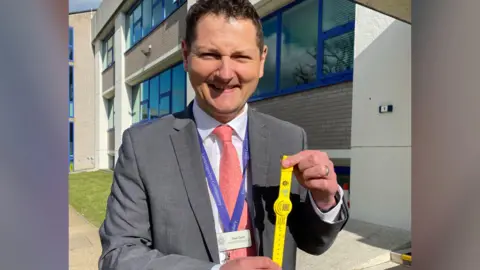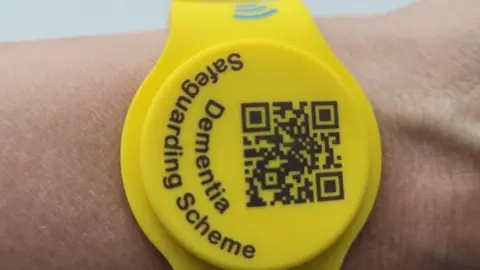Police launch dementia support scheme
 Cambridgeshire Police
Cambridgeshire PoliceA police force has started a new safeguarding scheme to support people living with dementia across the county who may have gone missing.
Cambridgeshire Police will issue smart yellow wristbands to hundreds of people living with the condition.
The project is part of Dementia Action Week and aims to create more awareness of the 10,000 people living in the county who have dementia, the force said.
The wristband contains people's next-of-kin's contact name and number, allowing the person to retain their freedom and independence but also giving them an extra measure of safety if they forget where they are or how to get home.
 Cambridgeshire Police
Cambridgeshire PolicePeople do not need to register for the wristbands, as the force is working with partners and the NHS to identify those most vulnerable.
Det Ch Insp Dave Savill, from the force's protecting vulnerable people unit, said: "It is crucial that people living with dementia can get to a place of safety and security, with friends or family, as quickly as possible [if needed].
"These wristbands will help to achieve that and reduce the demand on emergency services."
Members of the public who come across someone wearing a wristband and looking confused are asked to reassure them and use their mobile phone to scan and read the information on the band, which uses Near Field Communication (NFC) technology.
Dedicated form
The project comes after the force has continued to highlight the Herbert Protocol - which provides a form for carers to fill in with details about the person with dementia that they look after, which can then be referred to by police if someone goes missing.
The force has used social media to thank members of the public who have been able to help dementia patients with kindness and compassion.
Examples in recent months include the story of the reunited brothers in Huntingdon, a man who found an elderly woman on his doorstep in Peterborough and a confused woman who was trying to get into cars outside a school in Bottisham.
Since May 2023 when the scheme was newly highlighted on social media, the force said there had been at least 1,600 visits to its dedicated web page.
Det Ch Insp Savill said: "Families using our Herbert Protocol form can help officers find a missing person faster, as they will have the answers to lots of important questions straight away at the start of the investigation, which assists us greatly."
The Alzheimer's Society's Dementia Action Week starts on Monday.
Follow Peterborough news on BBC Sounds, Facebook, Instagram and X.
